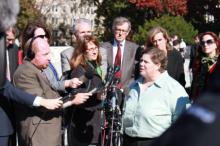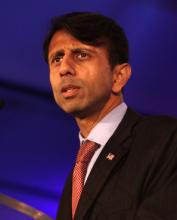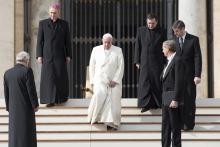Faith and Politics


The U.S. Supreme Court will soon rule on the constitutionality of prayer at public meetings. But a new survey finds U.S. voters clearly favor prayer – as long the public prayer is generic and not specifically Christian.
A Jew and an atheist brought suit in Greece, N.Y., saying the Christian prayers excluded many citizens and violated the Constitution, which bans government establishment of religion. Even when the town began inviting non-Christians to give invocations, the “establishment” issue remained a question.


Louisiana Gov. Bobby Jindal, widely considered a rising star in the Republican Party and a possible 2016 presidential candidate, will be the commencement speaker at Liberty University on May 10.
In an interview, Falwell was hesitant to give his personal opinion of Jindal since the two men have never met. Instead, he deferred to Liberty’s law school dean, Mat Staver.
“He’s a committed Christian,” Falwell said. “Mat Staver said he heard him speak and he sounded like a Baptist preacher.”

Muslim and civil rights groups welcomed the news that the New York City Police Department’s Demographics Unit will disband but said they still fear they may be targets of warrantless surveillance.
Muslim Advocates filed a lawsuit in 2012 to stop the program, and the group was later joined by the Center for Constitutional Rights.
“We need to hear from the mayor and NYPD officials that the policy itself has been ended and that the department will no longer apply mass surveillance or other forms of biased and predatory policing to any faith-based community,” said Ryan Mahoney, president of another Muslim civil rights group, the New York chapter of the Council on American-Islamic Relations.


Feeling anxious about your tax liability as April 15 nears? The Bible has many references to taxes that will sound strangely relevant at this time of year — beginning with the story of David and Goliath.
Many remember a teenage boy offended by insults thrown by a giant foe against his nation and God himself, who volunteers to go into battle with a slingshot. But did you know that a tax incentive was part of his prize?
Visiting the battlefield, David learns: “The king will give great wealth to the man who kills (Goliath) and will exempt his family from taxes in Israel,” (1 Samuel 17:25).
Throughout Scripture, tax discussions mark many passages, as ancient men and women worried about how they would pay.

It started when the United States Supreme Court determined that corporations were people and, as such, had similar rights and protections as us oxygen-breathing types. And now, in another recent decision, the court has decided that people (individual human beings or corporations) have the right to donate to an unlimited number of political candidates — therefore removing the aggregate cap on total donation amounts — as such gifts should be protected as an exercising of free speech, as defined in the constitution.
So much for representative democracy.
It’s my understanding that the founders of our nation and the framers of our constitution held the notion of representative democracy fairly sacred.

World Vision found itself testing the evangelical boundaries in March when it announced it would recognize employees’ same-sex marriages. Within 48 hours, it reversed itself.
At its core, the reversal raised a stark question: Can you be an evangelical and support same-sex marriage?
Reverberations from the policy flip-flop continue to unfold. Last week, Jacquelline Fuller, director of corporate giving at Google, resigned from the international relief organization’s board. Faithful America, an online Christian community focused on social justice, had gathered 16,000 signatures calling for Fuller and John Park, another Google employee who sits on the World Vision board, to step down.

I was dismayed when I learned that Mozilla Foundation, maker of the Firefox Web browser, had named an anti-gay activist as its new chief executive officer.
Brendan Eich wasn’t a hard-core activist. He had donated $1,000 in 2008 to a California campaign to ban same-sex marriage.
Even so, his ethical stance struck me as unfortunate. Mozilla’s naming him CEO struck me as tone-deaf. And his refusal to discuss his views seemed too aloof for a high-visibility enterprise like Mozilla.
I didn’t join the crowd demanding his resignation. I did the one thing I could do: I stopped using the Firefox browser.

Here’s a crash course to understand what’s happening in Australia with refugees and the politics of Jesus.
Imagine for a moment that in the lead up to the next U.S. elections, a political party changed immigration policies and took the relatively small number of people seeking safety on boats from, let’s say Cuba, and locked these persecuted people up on Guantanamo like criminals — elderly, men, women, and over 1,000 children. You would expect outcry from people across the political spectrum. Indeed there was. Only the fear campaign was so effective, the blame game so seductive and the election win so decisive, that the majority of politicians on all sides sacrificed their principles on the altar of popularity. Not to mention these desperate people — tired, poor, huddled masses yearning to breathe free — … these now homeless who were literally tempest-tossed on boats sacrificed on this bloody idol of false security. Of course behind closed doors, elected officials will confess to you, as a Christian, that they personally find it abhorrent but for the sake of the party and all the good they could do when they get into power they rationalize with the logic of Caiaphas and get the same results: the sacrifice of the innocent.
Sound too far-fetched? This is the recent history of Australia. Thanks, Paul Dyson, for the Cuba analogy.
On a cold day this past February, seminary student Sara Wolcott boarded a bus in New York to attend the Moral March in North Carolina.


TO PEOPLE interested in establishing a new community I would encourage them to see 1) who the leaders are, 2) what the purpose of the community is, and 3) what the commitment among them is. Many attempts at community fail because the reasons for living together are vague or “romantic.” I believe that where God’s people are gathered because that has been his word to them, there is a solid foundation on which to build.
Initially, most communities seem to face the same basic problems and struggles, ranging from eating habits to family life to priorities. When people come together committed to share openly, all of who they are eventually emerges. This, in turn, presents areas in the common life (like the ones mentioned above) that must be resolved.

Yesterday, the Supreme Court struck down a law that limited the amount of money that an individual can contribute to political campaigns in a two-year election cycle, while upholding the limit that an individual can give to a single campaign in the same period. Previously, the law limited total individual contributions to all political campaigns to $48,600, while capping individual donations to a single campaign at $2,600.
The bottom line of yesterday's McCutcheon v. Federal Election Commission ruling is that there will be more money in politics, as the Court doubles down on the controversial 2010 Citizens United v. Federal Election Commission ruling that allowed unlimited, anonymous expenditures by outside groups on election activities. Those with resources can now contribute up to $2,600 in all 435 congressional districts, more than 30 Senate races, and the presidential election, while at the same time giving millions more to Super PACs in support of these candidates.
The ruling will give more influence to corporate and labor lobbyists whose groups contribute to political campaigns. It is still illegal to give a donation that explicitly requests a legislative action in return for the contribution. But while politicians spend hours every week making phone calls soliciting contributions, they aren’t likely to forget who is funding their political future. When they hang up the phone and meet a lobbyist in their office whose group is funding their campaign, there is an unspoken understanding that the politician will be more open to the idea that lobbyist is presenting.

If some secular organizations had their way, much of the current class of lawmakers would flunk out of Congress.
The Secular Coalition for America, an umbrella organization of 13 nontheistic groups including American Atheists and The Freedom From Religion Foundation, issued a “report card” on members of the U.S.House of Representatives and Senate based on their votes on recent legislation involving church-state issues.
More than half of lawmakers received F’s, meaning, in the coalition’s eyes, they fail at upholding the separation of church and state.

Days after discussing the U.S. Catholic bishops’ fight over contraception with President Obama, Pope Francis met Monday with members of the Green family, the Oklahoma billionaires whose company, Hobby Lobby, took their challenge to Obama’s contraception mandate to the Supreme Court last week.
The pope met with Obama on Thursday for the first time, touching on some hot-button disputes between the White House and U.S. Catholic bishops.

Christian relief organization World Vision has reversed its decision after announcing this week that it will no longer define marriage as between a man and a woman in its employee conduct manual.
The earlier decision was a groundbreaking change for the Christian institution that came with heavy criticism from evangelicals. After its initial announcement, the Assemblies of God had urged its members to consider dropping support.
Ryan Reed tweeted on Wednesday (March 26), “My wife works for WV. In today’s staff meeting Stearns announced that so far 2000 kids dropped.”
World Vision’s child sponsorships are $35 a month, which means the organization could have lost at least $840,000 in revenue over the longterm.
About $567 million of World Vision’s $1 billion budget comes from private contributions, according to the 2012 annual report, according to Christianity Today.
“We’ve listened,” World Vision president Stearns told reporter, to supporters who were concerned about the conduct change in policy. “We believe we made a mistake. We’re asking them to forgive and understand our poor judgement in the original decision.”

Today, the Supreme Court heard two cases that have major implications for the intersection of religious liberty and health care in America. While Sebelius v. Hobby Lobby Stores and Conestoga Wood Specialties Corp. v. Sebelius were argued before the Court, hundreds of activists voiced their opinions outside the Court’s chambers.
The Court will decide whom the so-called “contraception mandate” law in the Affordable Care Act applies to. Both of the challengers to this section of the 2010 health law say that providing certain forms of birth control violates their sincerely held religious views. Though there are already exemptions in law for churches and some nonprofits, this case will decide whether for-profit corporations are offered protection under the religious liberty clause of the First Amendment to deny contraception coverage to their employees.